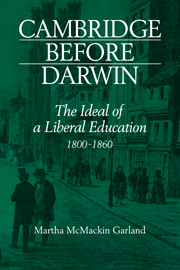Book contents
1 - An academic ancien regime
Published online by Cambridge University Press: 07 October 2011
Summary
In 1800 the University of Cambridge was to some extent a center of teaching and of learning, an institution dedicated both to the education of the young and to the advancement of thought. But any analysis of Cambridge is bound to be misleading unless it emphasizes another aspect of the University's character: it was a branch of the Church of England. Nearly all Anglican clerics studied at Cambridge or at Oxford. Degrees were granted only to members of the Established Church. University regulations included compulsory chapel and required courses in theology. And the colleges controlled vast networks of ecclesiastical patronage with which to help young graduates launch their clerical careers. Thus when a man went up to Cambridge he was doing much more (and in some ways much less) than enrolling himself in an educational program. He was joining a religious society – a college – in which he could have life-long membership and from which, if he chose to exert himself, he could expect permanent financial and emotional support.
Such an institution was a remarkably pleasant, tranquil place in which to live. For the permanent members of the colleges, the fellows, life could be very attractive indeed. Fellowships for life were awarded not on the basis of a candidate's academic promise but as a reward for his achievements as an undergraduate; in consequence, while fellows generally were bright, at least insofar as intelligence could be measured by a rigorous mathematical examination, there was no guarantee or even expectation that they would lead a life of real scholarship while serving as Cambridge dons.
- Type
- Chapter
- Information
- Cambridge Before DarwinThe Ideal of a Liberal Education, 1800–1860, pp. 1 - 12Publisher: Cambridge University PressPrint publication year: 1980



